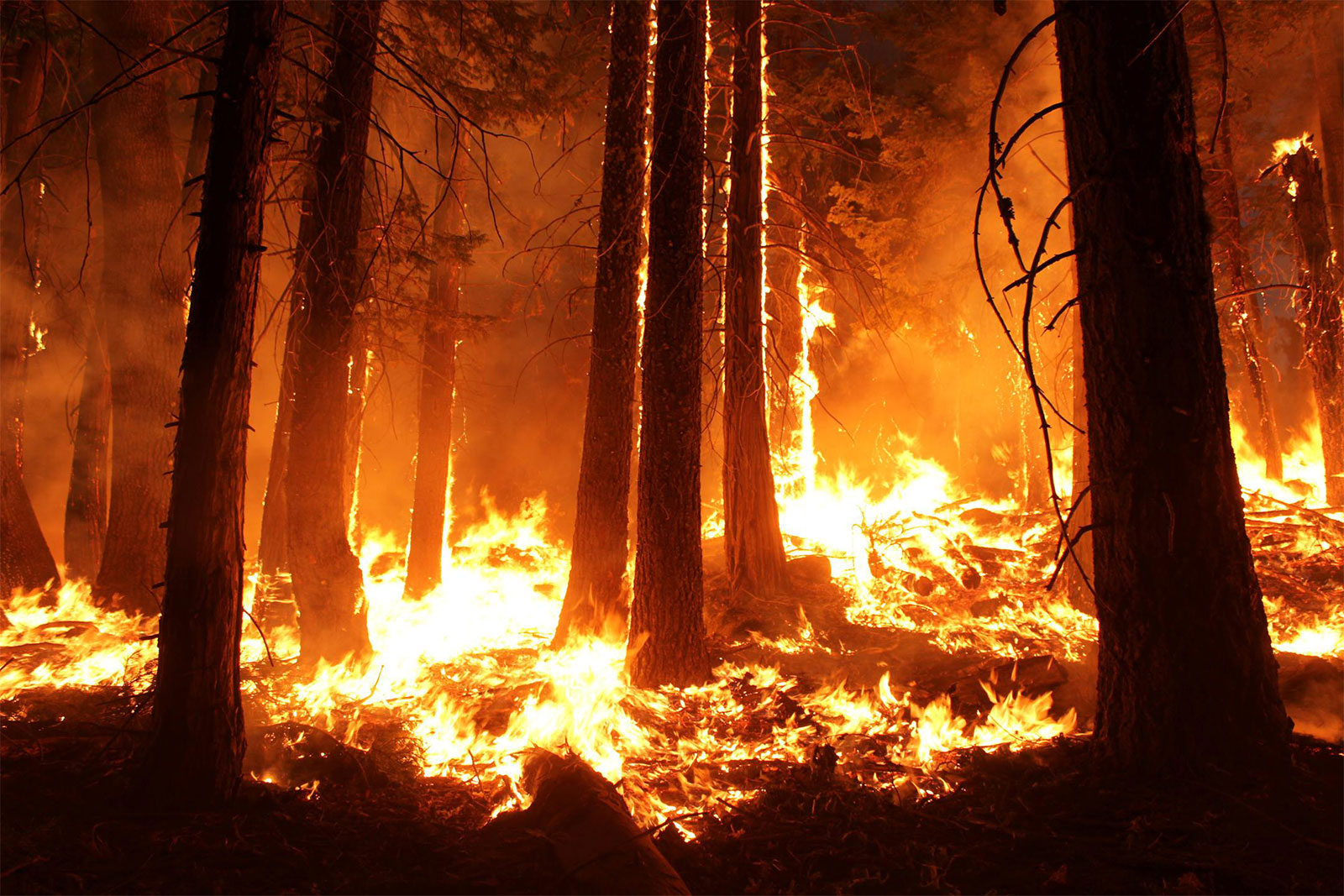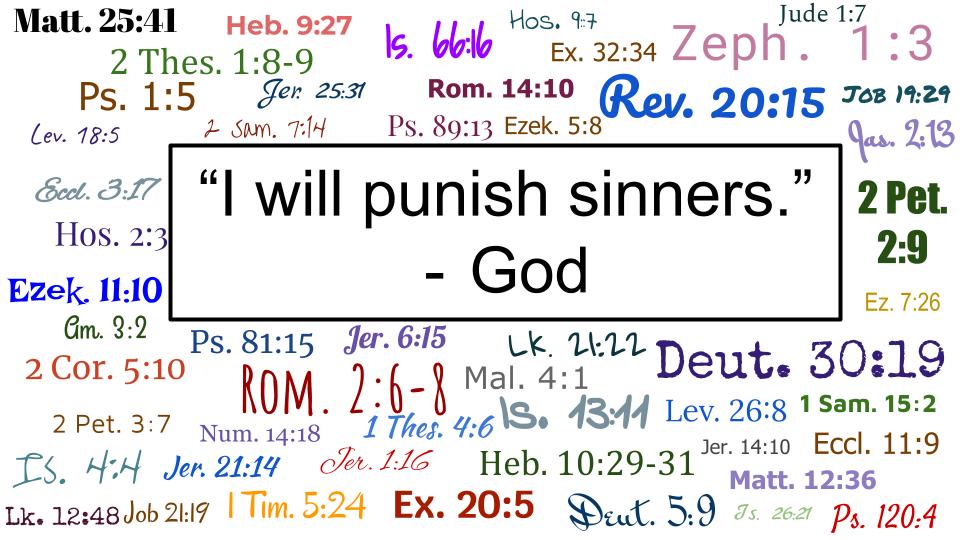
“And if anyone’s name was not found written in the book of life, he was thrown into the lake of fire.” Revelation 20:15
Hell is not a popular doctrine. Even among BIble-believing Christians hell is a doctrine that some choose to reject – refusing to believe that a loving God could condemn people to conscious suffering forever. Annihilationism is the belief that at some point the suffering of sinners in hell comes to an end and they simply cease to exist. Universalism is the belief that everyone eventually gets into heaven, though some need a time of purification (often called purgatory).
But what does the Bible actually teach?
“When the Son of Man comes in his glory, and all the angels with him, then he will sit on his glorious throne. Before him will be gathered all the nations, and he will separate people one from another as a shepherd separates the sheep from the goats. And he will place the sheep on his right, but the goats on the left… And these will go away into eternal punishment, but the righteous into eternal life.”
Matthew 25:31-33,46
The same word used for LIFE is also used for PUNISHMENT – and the word is “eternal.” There is no Biblical warrant for the idea that the suffering people endure in hell will at some point come to an end. In fact, there is strong Biblical evidence that the human soul is immortal and must exist forever. The question is not whether people will live forever, the question is where they will live.
Often we think of heaven being “up there” and hell being “down below.” Still today we think in spatial terms, hoping that our loved ones who pass away go up into the “heavens” rather than down into the ground. In ancient times the underworld, ruled by Hades, was understood to be in the earth or under the earth – an inescapable place of terrifying torment.
But it’s important to remember that when the Bible speaks of hell the writers are using metaphors, they are using powerful images to symbolize unimaginable suffering and agonizing regret. Consider the ways that hell is described:
- “Eternal punishment” Matt. 25:46
- “The fiery furnace” Matt. 13:50
- “Where their worm does not die and the fire is not quenched” Mark 9:48
- “The lake of fire” Rev. 20:14-15
- “The wrath of God remains on him” John 3:36
- “Wrath and fury… tribulation and distress” Rom. 2:8-9
- “The land of darkness and deep shadow” Job 10:21
- “Outer darkness” Matt. 8:12
- “The gloom of utter darkness” Jude 1:13
- “Weeping and gnashing of teeth” Matt. 13:42
- “The second death” Rev. 21:8
- “The punishment of eternal destruction, away from the presence of the Lord” 1 Thes. 1:9
- “Outside” Rev. 22:15
- “Trampled… in my wrath” Isaiah 63:3
The consistent truth in all of these descriptions is suffering. Hell will be a place of unending anguish, with no relief. It’s hard to imagine a fiery lake that is also pitch dark – which indicates the different kinds of imagery are evoking a feeling rather than a physical reality. In the end, does it matter if it’s literally a body of water that constantly boils and burns or if it’s a place of utter isolation and darkness? The despair of hell is the inescapable and unending nature of it.
“He also will drink the wine of God’s wrath, poured full strength into the cup of his anger, and he will be tormented with fire and sulfur in the presence of the holy angels and in the presence of the Lamb. And the smoke of their torment goes up forever and ever, and they have no rest, day or night.”
Revelation 14:10-11
Is hell a reality? The consensus of Scripture from beginning to end is a resounding “Yes.” God will punish sinners.

“And God said to Noah, ‘I have determined to make an end of all flesh, for the earth is filled with violence through them. Behold, I will destroy them with the earth.'”
Genesis 6:13
Will hell last forever? Again, the definitive answer is “Yes.” If we believe heaven will last forever we have no reason to believe that hell will somehow end.
Is hell fair? We struggle to understand eternal suffering as a just consequence for a finite lifetime of sin. But what does rebellion against the holy God of heaven warrant?
“At some point, God says, okay, I have shown you my goodness and my grace, and you don’t want that. So you get exactly what you want. The Bible warns that that’s great pain. That’s great hardship to the soul to be without God. But at some point, God says, okay, I’ll give you what you want. Those who want me, they get me. That’s Heaven. Those who don’t want me, they don’t get me. They get what they want.”
Bryan Chappel, What is Hell – a Biblical Guide
This is a helpful paraphrase of C.S. Lewis:
“There are only two kinds of people in the end: those who say to God, ‘Thy will be done,’ and those to whom God says, in the end, ‘Thy will be done.’ All that are in Hell, choose it. Without that self-choice there could be no Hell. No soul that seriously and constantly desires joy will ever miss it. Those who seek find. Those who knock it is opened.”
C.S. Lewis, The Great Divorce
Where is God in relation to hell? One metaphor for hell is “outer darkness,” “away from the presence and glory of God.” But what does the Bible teach about God? Is there a place where God is not? As an omnipresent spirit being, can God create a place where He is not? That’s a mind-bender along the lines of “can an all-powerful God make a rock so big He can’t lift it?” What does the Bible say?
“Where shall I go from your Spirit? Or where shall I flee from your presence? If I ascend to heaven, you are there! If I make my bed in Sheol, you are there!”
Psalm 139:7-8
Hell is separation from the blessing of God. But it is impossible to escape the presence of God. Think of God as an ocean. Every human soul will spend forever in the ocean of God’s holy presence. The only question is whether you are prepared to enjoy Him. In this analogy, all people are born CATS. By nature, as sinners, we cannot enjoy the holiness and glory of God. Only those who are transformed by faith in Jesus – born again, a new creation – can experience the presence of God with joy. So conversion changes a cat into a DOLPHIN (or pick your favorite ocean creature). When you die, if you have been transformed in Christ, you will be joyfully immersed in the fullness of God’s glorious goodness forever! But if you have not been transformed, you will be thrust into an experience that will be hell for you.
Read more about God’s wrath here.
Check out this video from magician Penn Jillette (a vocal atheist) for a clear application of the doctrine of hell. If we really believe people end up in misery forever, how can we not tell people about the way of salvation?
